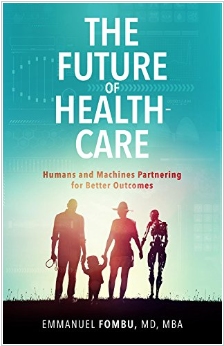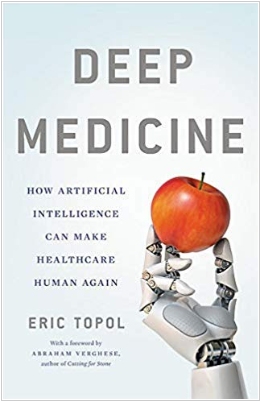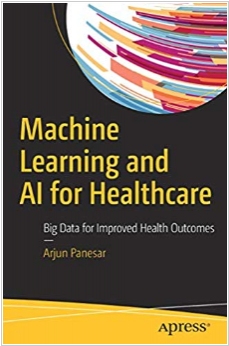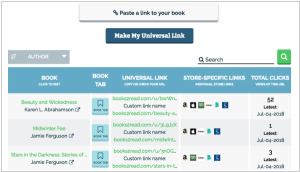3 Best books on AI for Medicine and Healthcare
September 05, 2025 | Author: Maria Lin
Here is my list of 5 most interesting books about artificial intelligence for Health:
1. The Future of Healthcare: Humans and Machines Partnering for Better Outcomes

This book attempts to imagine a near future in which our health is monitored by virtual assistants. For example, it follows Diane, a 53-year-old librarian. Every morning at 7:15 a.m. she is woken by the cheerful voice of Amazon's Alexa. Alexa knows that 7:15 a.m. is the best time to wake Diane based on her circadian rhythm and data from her smartwatch. When Diane starts feeling unwell at work (dizzy, tired and chilly), her smartwatch records an elevated heart rate and temperature and automatically sends the data to her doctor, Dr. Barlow. His virtual assistant cross-references these data with Diane's medical records and warns her to urgently visit him for check-up. Based on her medical history and analysis of other patients with similar symptoms, Barlow knew that kidney disease was unlikely and his virtual assistant calculated that there was a 93% chance they were dealing with sepsis. Barlow took a chance and prescribed antibiotics and said she could go home as long as she wore the hospital's health tracker and sent in a digital blood sample using one of their disposable kits. Within two days, Diane's creatinine levels were back to normal and she's never felt better.
2. Deep Medicine: How Artificial Intelligence Can Make Healthcare Human Again

According to this book the promise of AI in medicine is to provide holistic, panoramic views of an individual’s medical data; to improve decision-making; to prevent errors such as misdiagnosis and unnecessary procedures; to help interpret appropriate tests and to recommend treatments. At the heart of all this is data. We are already living in the era of Big Data: the world produces zettabytes of data every year. For medicine, big datasets take the form of whole-genome sequences, high-quality images and continuous data from wearable sensors. However, most deep learning use cases so far have been in-silico rather than in prospective human clinical trials. This is an important distinction, as analyzing retrospective data is very different from collecting data in a real clinical environment. Retrospective in-silico results often represent a rosy best-case scenario that does not always hold up in forward-looking analyses.
3. Machine Learning and AI for Healthcare: Big Data for Improved Health Outcomes

This book explores the potential of machine learning for healthcare. The author argues that intelligent systems can help us reverse disease, identify cancer risk and suggest treatments based on real-time biomarker data. But this raises an interesting question. If an intelligent system can identify a disease risk, should it tell the patient what it has detected? If an algorithm can determine the risk of pancreatic cancer—an often fatal disease—based on blood glucose and weight, is it ethical to tell the patient? Moreover, should such sensitive data be shared with healthcare oragization—and what are the unintended consequences of doing it? If the patient refuses to share the data, is it ethical to aggregate the data based on existing information to predict the same disease risk? The ethics of artificial intelligence still lacks clear guidelines, rules and parameters for how to manage this patient data. But the important thing is that as AI-based technology advances, new and improved treatments and diagnostics will save more lives and cure more diseases. With the future of medicine driven by data and analytics, the question arises: will there ever be enough data?
See also: Top 10 eBook Organizers
1. The Future of Healthcare: Humans and Machines Partnering for Better Outcomes

This book attempts to imagine a near future in which our health is monitored by virtual assistants. For example, it follows Diane, a 53-year-old librarian. Every morning at 7:15 a.m. she is woken by the cheerful voice of Amazon's Alexa. Alexa knows that 7:15 a.m. is the best time to wake Diane based on her circadian rhythm and data from her smartwatch. When Diane starts feeling unwell at work (dizzy, tired and chilly), her smartwatch records an elevated heart rate and temperature and automatically sends the data to her doctor, Dr. Barlow. His virtual assistant cross-references these data with Diane's medical records and warns her to urgently visit him for check-up. Based on her medical history and analysis of other patients with similar symptoms, Barlow knew that kidney disease was unlikely and his virtual assistant calculated that there was a 93% chance they were dealing with sepsis. Barlow took a chance and prescribed antibiotics and said she could go home as long as she wore the hospital's health tracker and sent in a digital blood sample using one of their disposable kits. Within two days, Diane's creatinine levels were back to normal and she's never felt better.
2. Deep Medicine: How Artificial Intelligence Can Make Healthcare Human Again

According to this book the promise of AI in medicine is to provide holistic, panoramic views of an individual’s medical data; to improve decision-making; to prevent errors such as misdiagnosis and unnecessary procedures; to help interpret appropriate tests and to recommend treatments. At the heart of all this is data. We are already living in the era of Big Data: the world produces zettabytes of data every year. For medicine, big datasets take the form of whole-genome sequences, high-quality images and continuous data from wearable sensors. However, most deep learning use cases so far have been in-silico rather than in prospective human clinical trials. This is an important distinction, as analyzing retrospective data is very different from collecting data in a real clinical environment. Retrospective in-silico results often represent a rosy best-case scenario that does not always hold up in forward-looking analyses.
3. Machine Learning and AI for Healthcare: Big Data for Improved Health Outcomes

This book explores the potential of machine learning for healthcare. The author argues that intelligent systems can help us reverse disease, identify cancer risk and suggest treatments based on real-time biomarker data. But this raises an interesting question. If an intelligent system can identify a disease risk, should it tell the patient what it has detected? If an algorithm can determine the risk of pancreatic cancer—an often fatal disease—based on blood glucose and weight, is it ethical to tell the patient? Moreover, should such sensitive data be shared with healthcare oragization—and what are the unintended consequences of doing it? If the patient refuses to share the data, is it ethical to aggregate the data based on existing information to predict the same disease risk? The ethics of artificial intelligence still lacks clear guidelines, rules and parameters for how to manage this patient data. But the important thing is that as AI-based technology advances, new and improved treatments and diagnostics will save more lives and cure more diseases. With the future of medicine driven by data and analytics, the question arises: will there ever be enough data?
See also: Top 10 eBook Organizers



